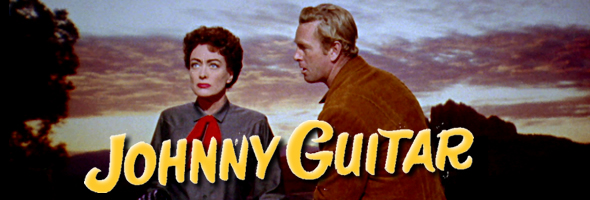

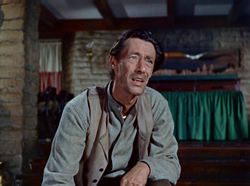
The screen's first truly psychosexual western, Johnny Guitar is exactly the film to put on when you want to prove to someone that the '50s were a lot more twisted than pop culture might have you believe. Director Nicholas Ray was really gearing up for Technicolor melodramatics here (and would equal it the next year with the lege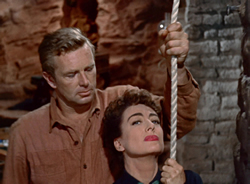 ndary Rebel without a Cause), and the massive tensions on the set between star Joan Crawford and many of the cast and crew wound up producing a truly one-of-a-kind cult curio that blasts past the limits of camp and into pure operatic delirium.
ndary Rebel without a Cause), and the massive tensions on the set between star Joan Crawford and many of the cast and crew wound up producing a truly one-of-a-kind cult curio that blasts past the limits of camp and into pure operatic delirium.
Tough, strong-willed saloon owner Vienna (Crawford) dreams of starting up her own town along the path of a developing railroad through Arizona, but fate seems to be conspiring against her. The ferocious, very butch Emma (McCambridge) thinks Vienna's going to ruin the town by hanging out with a bunch of lowlifes and a particularly insidious plan to get Vienna out of her hair, but things are complicated by the arrival of Johnny Guitar (Hayden), Vienna's new entertainer who goes back with her a little further than most people realize. Everything builds to a prolonged fever pitch involving lynchings, shoot outs, and Technicolor romantic clutches, not necessarily in that order.
A lot of critical ink has been spilled trying to parse exactly what's going on in this one. Are Emma and Vienna enacting some sort of repressed homoerotic dance of death? Are all the emasculated men in this film some sort of Sirkian commentary on the rigid gender roles of Eisenhower-era America? Is the duplicity and tension among the townspeople against the wrong people a mirror for the McCarthy witch hunts against accused communists? (That last one seems likely, given that this was co-written without credit by blacklisted Ben Maddow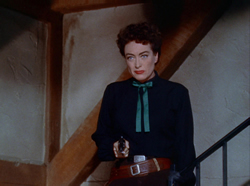 .) Each viewer will probably come up with a unique interpretation, but what's indisputable is the fact that this film is a complete blast from start to finish. Seeing the traditional roles of men and women flipped around and dosed up with a heavy dose of black leather
.) Each viewer will probably come up with a unique interpretation, but what's indisputable is the fact that this film is a complete blast from start to finish. Seeing the traditional roles of men and women flipped around and dosed up with a heavy dose of black leather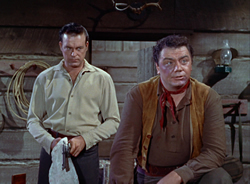 and lots of rope imagery makes this one seriously bizarre western indeed, at times feeling closer to something like Satan in High Heels than anything John Ford ever turned out. On top of that you get an incredible cast, with the normally formidable Sterling Hayden (who appeared in Suddenly the same year) often eclipsed on the screen by scene-stealing character actors like John Carradine, Ernest Borgnine, and Royal Dano. You also get a dreamy theme song (sung at points by Peggy Lee), which was memorable enough to give someone the idea to eventually turn this into a stage musical. However, the real stars here are easily Crawford and McCambridge, whose real-life hatred of each other translates into pure dramatic gold (much as Crawford would later experience even more famously opposite Bette Davis in What Ever Happened to Baby Jane?). A lot of critics at the time were confused by a film ending with two women in cowboy pants facing off against each other with guns drawn, but fortunately subsequent generations had no problem figuring out that something special was going on here.
and lots of rope imagery makes this one seriously bizarre western indeed, at times feeling closer to something like Satan in High Heels than anything John Ford ever turned out. On top of that you get an incredible cast, with the normally formidable Sterling Hayden (who appeared in Suddenly the same year) often eclipsed on the screen by scene-stealing character actors like John Carradine, Ernest Borgnine, and Royal Dano. You also get a dreamy theme song (sung at points by Peggy Lee), which was memorable enough to give someone the idea to eventually turn this into a stage musical. However, the real stars here are easily Crawford and McCambridge, whose real-life hatred of each other translates into pure dramatic gold (much as Crawford would later experience even more famously opposite Bette Davis in What Ever Happened to Baby Jane?). A lot of critics at the time were confused by a film ending with two women in cowboy pants facing off against each other with guns drawn, but fortunately subsequent generations had no problem figuring out that something special was going on here.
Shot in the very problematic Trucolor process favored by Republic Pictures, Johnny Guitar has always looked pretty iffy on home video (and even in revival prints). A popular DVD release in France barely looked better than the soft and smudgy VHS tape, and for many years fans lamented the absence of a decent edition in any format. Fortunately those prayers were answered when the various rights machinations involving Paramount and the Republic library landed this one with Olive Films, whose HD presentation on Blu-Ray is a substantial upgrade in every category. Colors look much more stable and clearly delineated here, flesh tones don't bleed and turn into orange mush anymore, and clothing detail can finally be seen with satisfying precision. The original color process means this will never look as good as, say, The Red Shoes; for some reason studios felt the need to tamper with new processes during the '50s and came up with some truly ugly results, especially in the case of major missed opportunities like Brigadoon. In short, it's tough to imagine Johnny Guitar looking any better than this, and the DTS-HD mono track sounds pretty darn nice, too. On the extras side, you get a brief (three minutes and change) video intro by Martin Scorsese, a lifelong fan of the film who sketches out some of the more interesting facts about it and explains why he loves it so much. Watch and prepare to be amazed.
![]()